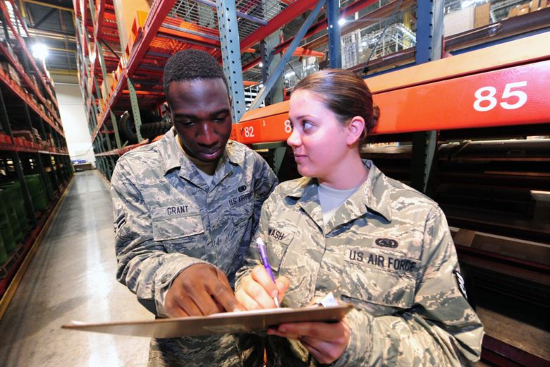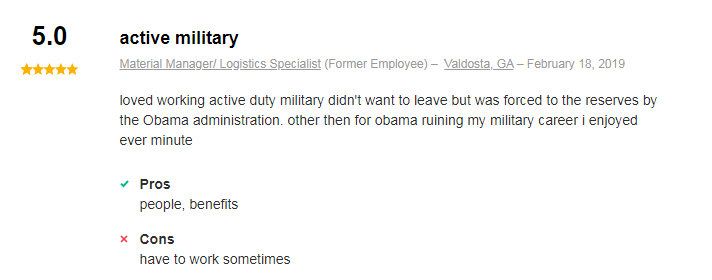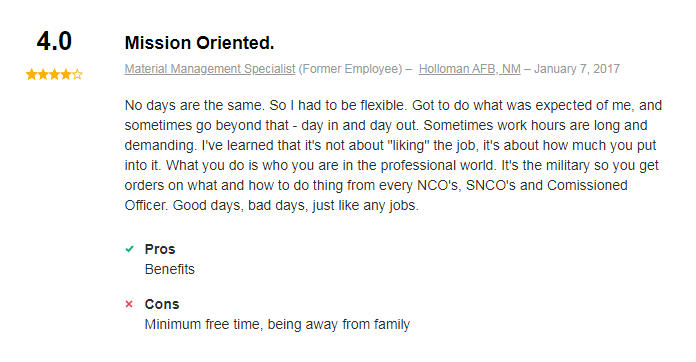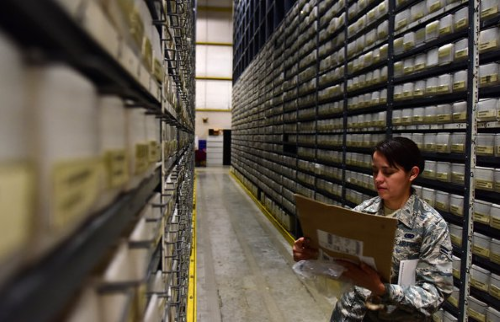The fiercest militaries in the world are nothing unless they are constantly kept supplied with their needs.
That’s what makes the job that Air Force Materiel Management personnel do so critically important.
Air Force Materiel Management Specialists move everything from million-dollar aircraft parts to a box of pencils.
They are the managers of the complex supply system that fuels both the US Air Force and other military branches.
No matter what the needs are of the Air Force or other military commands, Air Force Materiel Management personnel make sure they get the critical supplies that they need.
This is a military job that’s older than the Air Force itself.
The vital importance of keeping an army supplied to keep it functioning has been known since the dawn of time.
Anyone who enters into this Air Force career field will not only be working in a fast-paced and rewarding job but also will be building a foundation that will set them up for a variety of civilian career employment opportunities.
Here is a YouTube video that talks more about what Air Force Materiel Management personnel do:
Materiel Management Requirements and Qualifications
Here are the requirements and qualifications one must meet in order to start training as an Air Force Materiel Management Specialist.
ASVAB Requirements
-
-
- Minimum ASVAB Score of 44 in the General category and 41 in the Administrative category
-
Additional Qualifications
-
-
- Be between the ages of 17 and 39
- Possess a GED or high school diploma
- Knowledge of basic mathematics
- Be able to lift 60 lbs.
- Having a driver’s license and a clean driving record is a bonus
- Successful completion of 8.5 weeks of Air Force Basic Military Training held at Joint Base Lackland in San Antonio, TX (Not required of those with prior military experience or training)
-
Related Article – Air Force Radar, Airfield & Weather Systems (1C8X3): Career Profile
Training and Career Path to Become an Air Force Materiel Management Specialist
Here is the technical and on the job training it takes to be able to perform the duties that are asked of an Air Force Materiel Management Specialist.
Air Force Technical Training Information

If you are not one of those people that like learning in a classroom setting than this is a great Air Force career choice.
Most of the learning takes place in a hands-on type of environment.
There is however a brief 33-day technical training period that covers the most basic aspects of being an Air Force Materiel Management Specialist.
This training takes place right at Joint Base Lackland in San Antonio, TX.
During technical training recruits will be taught such key material management functions as inventory taking, logistics, supply storage, accountability, parts database management, and aspects of proper customer service.
On the Job Training
While Air Force Technical Training provides a recruit with the basics that they will need to perform the duties required of an Air Force Materiel Management Specialist, more specific job-related training will be done on an OJT basis.
This will be conducted at a new recruit’s first duty assignment.
On the job training can last anywhere from 2 to 3 months before a new recruit can function on their own as a qualified Air Force Materiel Management Specialist.
During this phase of training, a new recruit will learn such aspects of material handling as using job-specific manual and automated materiel management accounting systems.
They will also be taught relevant logistics and procurement principles, transportation methods, proper handling of hazardous and other waste materials, and how to carry out standard deployment and emergency contingency material handling operations.
Related Article – Air Force Combat Controller – CCT (1C2X1): Career Details
How Much Are Materiel Management Specialists Paid?
Those without prior military experience or other relevant career-related experience will most likely be initially classified as an Airman Basic (E-1).
New recruits into this career field with a strong retail, logistics or supply background may be able to start out as high as an Airman (E-2) or Airman First Class (E-3).
Here is the current pay scale for Air Force enlisted members based on time in service and rank:
| Insignia | Pay Grade | Rank | Abbreviation | 2023 Minimum Monthly Pay |
|---|---|---|---|---|
| E-1 +4 months | Airman Basic | AB | $1,917.60 | |
| E-2 | Airman | Amn | $2,149.20 | |
| E-3 | Airman First Class | A1C | $2,259.90 | |
| E-4 | Senior Airman | SrA | $2,503.50 | |
| E-5 | Staff Sergeant | SSgt | $2,730.30 | |
| E-6 | Technical Sergeant | TSgt | $2,980.50 | |
| E-7 | Master Sergeant | MSgt | $3,445.80 | |
| E-8 | Senior Master Sergeant | SMSgt | $4,957.20 | |
| E-9 | Chief Master Sergeant | CMSgt | $6,055.50 | |
| E-9 | Command Chief Master Sergeant | CCM | $6,055.50 | |
| E-9 | Chief Master Sergeant Of The Air Force | CMSAF | $6,055.50 |
Other forms of pay and incentives that some Air Force Materiel Management Specialists may receive include such things as:
-
-
- Housing allowance for those that live off base (BAH)
- Subsistence allowance (Food – BAS)
- Temporary duty pay
- Remote location pay (separation pay)
- Hazardous duty pay
- Cost of living incentives
- Tuition reimbursement
-
Of course, all health care requirements for any Air force enlisted member are always 100% covered.
Related Article – Air Force Cyber Warfare (1B4X1): Career Details
What’s Life Like as a Materiel Management Specialist?
If you choose to enter into this Air Force career field, there are a variety of different types of Materiel Management positions that you may end up doing.
These include such things as:
-
-
- Maintenance material support
- Equipment accountability
- Flight service support
- Warehouse Inventory
- Mobile readiness support
- Inter-base logistics support
-
Among the many different tasks that Air Force material handling personnel are asked to do include:
-
-
- Plays an active role in managing all materiel management activities such as inventory control, storage, supply handling and operation of the related support equipment.
- Must be able to use a materiel database to research and determine future supply needs and get those materials ordered into the supply chain.
- Performs operations that involve the proper storage and identification of materials that fall under their area of responsibility.
- Receive goods, inspect the quality of those goods, and distributes them to their proper storage areas.
- Develop procedures that enhance the current methods that are used to receive, store, and distribute Air Force goods.
- Manage supply, distribution, and warehouse storage facilities.
- Store, issue, ship, and transfer Air Force property.
- Keep a tight control on sensitive, classified, extremely valuable, and highly controlled items.
- Manage the supply and distribution of repair items.
- Other responsibilities include the evaluation of inventory management activities. This means checking for compliance with proper Air Force material handling policies, procedures, and accountability measures.
-
This can be a good Air Force career for those that have families too.
That’s because temporary duty assignments in this career field are not as frequent as they are with many other Air Force jobs.
Job Reviews
Here are some reviews that were written by those who worked in this Air Force career.
They were found on the website Indeed.com.


Materiel Management Civilian Career Opportunities
There is no shortage of jobs that can use the skills that a well-trained Air Force Materiel Management specialist has to offer.
Just like the military branches are fueled by their supply chains, so too are the many retail outlets, mass parts suppliers, and stores that are found in every corner of the United States.
Typical positions that former Air Force Materiel Management specialists qualify for include:
- Warehouse support
- Mass delivery support
- Inventory management
- Purchasing clerks
- Trucking, train, and air logistics support
Here are some of the companies that can use the skills that an Air Force Materiel Management specialist learns during their time in the military:
- Tailored Training Programs, LLC – Fort Bragg, NC
- Aerojet Rocketdyne – Sacramento, CA
- Spectrum Comm Inc – Robins AFB, GA
- The Logistics Company – Fort Jackson, SC
- Christopher Newport University – Newport News, VA
- Akima, LLC – Andrews AFB, MD
Pay for these jobs is based on the amount of experience an Air Force enlisted member gained during their career.
These jobs typically start out at better than $40,000 a year and much higher for those that are senior enlisted NCO’s.
References:
Official Air Force Recruiting Page
Air Force Reserve Official Page
- 5 Worst Jobs in the Air Force - June 20, 2024
- 4 Steps For Visiting An Air Force Recruiter Near You - June 19, 2024
- Air Force Safety Specialist (1S0X1) - June 19, 2024
General FAQ
What is material management in the Air Force?
An Air Force Materiel Management Specialist works in logistics, responsible for moving parts, goods, and other supplies throughout the USAF supply chain.
How much does an Air Force Materiel Management Specialist make?
Like all military personnel, an Air Force Materiel Management Specialist is paid according to rank and time in service. Currently, airmen with rank of E-1 and less than two years of service make a base pay of $1,733 per month.
What ASVAB scores are required to get into Air Force Air Force Materiel Management?
To become an Air Force Materiel Management Specialist, you’ll need a minimum score of 44 in the General category and 41 in the Administrative category of the Armed Forces Vocational Aptitude Battery.
How long is tech school for Air Force Materiel Management?
Tech school for USAF Materiel Management is 33 days long and takes place at Joint Base Lackland in San Antonio, Texas. However, continuing training occurs on the job at your first duty assignment.
What can an Air Force Materiel Management Specialist do in the civilian world?
With training in logistics and supply, an Air Force Materiel Management Specialist can find work in warehouse logistics, inventory management, purchasing and transport logistics after separation or retirement.
Originally posted on January 16, 2020 @ 3:18 am
Affiliate Disclosure: This post may contain affiliate links. If you click and purchase, I may receive a small commission at no extra cost to you. I only recommend products I have personally vetted. Learn more.
